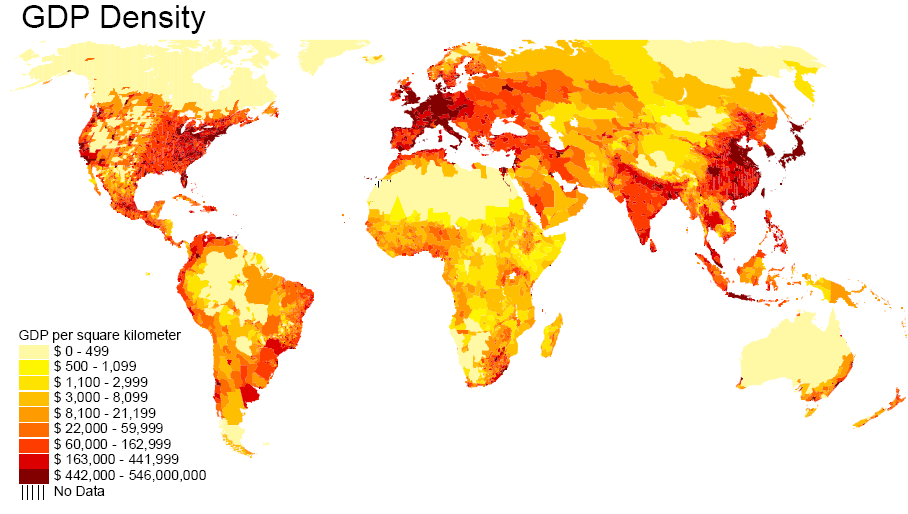Avant propose
How
to manage assets that jointedly provide a common resource? How to
measure health of the commons? How to assess a composite of assets?
How to assess changes of a composite? To consider these questions one
may turn to indexes as descriptors, or even to a single index that is
designed to provide a middling representation. This kind of
descriptors, such as the "Gross
Domestic Product per Capita"
[#] to name one of the most widely used indexes, appeal to provide
first-hand guidance for management options and policy choices. That
is their charm and their risk.
 |
| from: http://econbrowser.com/archives/2007/01/the_distributio |
[#] averaging economic contributions weighted by their monetary value over a group of people
Introduction
Since
the last 3.5 Billion years the ocean, possibly is the essential
ecosystem-service-provider of Earth. The ocean produces half of the
free oxygen in the atmosphere, stabilises our climate and facilitates
plate tectonics. The ocean is a global resource exploited by
humankind. The interplay between humankind's economy and marine
ecosystems can be described as "the human-ocean system".
The ocean is beneficial for societal wealth and human development.
It offers access to food, materials, energy, and recreational
opportunities. Therefore managing the human-ocean system in a
sustainable manner, is paramount to maintain the "health of the
ocean".
 |
| from: http://fishing-living.org/participation-in-the-3rd- coral-triangle-regional-business-forum/ |
Regional
seas are theatres of competing economic interests that significantly
influence the stage of the global ocean. Already today, many seas are
in a poor state. Overfishing shifts balances of ecosystems. Pollution
caused by extractive industries threatens living resources. Marine
litter spoils recreation. Plastic disrupts marine life along the
entire food web with eventual health effects on humans. Alterations
of coastal zones destroy unique habitats and resilience of living
spaces, etc. Rapid deployment of advanced technologies enables
penetration and extraction of resources in areas previously too harsh
or difficult to get to. And thus, are eliminating the last natural
refuges of marine life and this without adequate "compensation"
by marine sanctuaries.
On
one side, the risk is high that widespread implementation of “blue
economy strategies” will increase the general pressure on marine
environments. On the other side, treating the marine environment as
a jointly managed common resource increases the possibility to
foster its sustainable use. Management however needs standardized
tools; e.g. to compare options. In that context, a means to assess
the ‘health of the ocean’ in a standardized manner would be much
appreciated.
 |
| from: http://www.oneworldoneocean.com/blog/entry/introducing-the-ocean-policy-health-index |
The Ocean Health Index - summary & revisited.
The Ocean Health Index - mathematics visited.
Excursions - one, two, three.
Lesson, insight, and afterthought.
Post Scriptum
How
to generalize this experience? What has been discussed above for the
ocean health index applies
mutatis mutandis
to other indices that are calculated as a single score for a composite of assets that can substitute each other.
Reference for all sections:
[c]
The single assets of the ocean-health index are: (1) Artisanal
Fishing Opportunities, (2) Biodiversity i.e. species and habitats,
(3) Coastal Protection, (4) Carbon Storage, (5) Clean Waters, (6)
Food Provision i.e. fisheries and aquaculture, (7) Coastal
Livelihoods & Coastal Economics, (8) Natural Products, (9) Sense
of Place i.e. iconic species’ and special places, and (10) Tourism
& Recreation [x].
[d]
http://en.wikipedia.org/wiki/Social_choice_theory
[e]
http: //en.wikipedia.org/wiki/Generalized_mean
[f]
http://en.wikipedia.org/wiki/Higher-order_function
[1]
An index to assess the health and benefits of the global ocean
(2012). Benjamin S. Halpern, Catherine Longo, Darren Hardy, Karen L.
McLeod, Jameal F. Samhouri, Steven K. Katona, Kristin Kleisner, Sarah
E. Lester, Jennifer O’Leary, Marla Ranelletti, Andrew A. Rosenberg,
Courtney Scarborough, Elizabeth R. Selig, Benjamin D. Best, Daniel R.
Brumbaugh, F. Stuart Chapin, Larry B. Crowder, Kendra L. Daly, Scott
C. Doney, Cristiane Elfes, Michael J. Fogarty, Steven D. Gaines,
Kelsey I. Jacobsen, Leah Bunce Karrer, Heather M. Leslie
et al.,
Nature
488.
doi:10.1038/nature11397
[2]
How healthy is the human-ocean system? (2014). Wilfried Rickels,
Martin F. Quaas and Martin Visbeck.
Environmental Research Letters
Vol. 9(4). doi:10.1088/1748-9326/9/4/044013
No comments:
Post a Comment